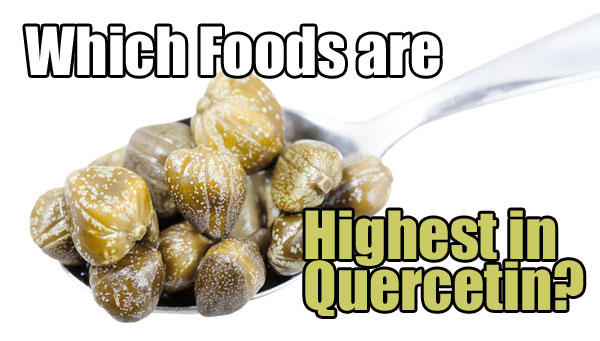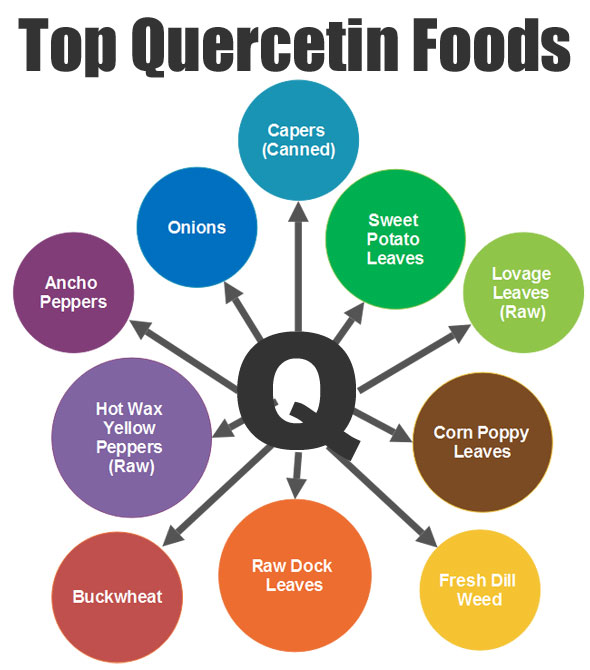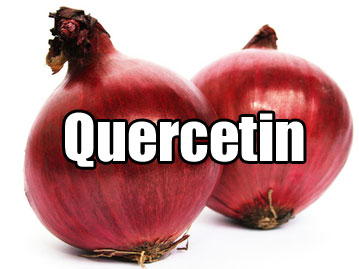Do you want to increase your quercetin consumption? Whether it be as a natural antihistamine or another reason, it makes sense to look at food sources first.

So, Which Foods are the Best Sources of Quercetin?
According to the functional medicine website of Michael Andrew Arata, MD, “Foods high in quercetin include red wine, red grapes, onions, green tea, apples, cranberries, blueberries, black plums, red leaf lettuce, raw kale, chicory greens, raw spinach, sweet peppers, snap beans and raw broccoli. The best whole food source of quercetin is capers.”
The Tufts University Health & Nutrition Letter says that red apples are exceptionally high in quercetin, but it is important to eat the skin where most of it is concentrated.
If you want a more detailed list of quercetin sources, Antioxidants.org provides a chart of foods with quercetin, listed by mg per 100 grams. Note that capers may contain a high level of the flavonoid as compared to something like butterhead lettuce. However, it’s much easier to eat 100 grams of butter head lettuce than 100 grams of capers.

Some of the Top Quercetin Foods are:
- Capers, Canned
- Lovage Leaves, Raw
- Hot Wax Yellow Peppers, Raw
- Fresh Dill Weed
- Raw Dock Leaves
- Ancho Peppers
- Onions
- Sweet Potato Leaves
- Corn Poppy Leaves
- Buckwheat
If you want an even longer, more comprehensive list of quercetin foods, I invite you to take a look at the USDA Database for the Flavonoid Content of Selected Foods. It has all information you could ever want… and more. Maybe even too much. 😉
Of course, it seems like everyone on the internet has their own opinion on high quercetin-containing foods. Here are some more articles that I found on the subject:
 The Institute for Natural Healing states that quercetin is found in apple cider vinegar. This makes sense, since this flavonol is found in apples.
The Institute for Natural Healing states that quercetin is found in apple cider vinegar. This makes sense, since this flavonol is found in apples.
Many people drink apple cider vinegar diluted in water for a variety of health reasons, including aiding in digestion and clearing skin. Some even claim it helps with weight loss. In any case, it’s known for promoting health.
The US National Library of Medicine conducted a study titled, “Evaluation of indigenous grains from the Peruvian Andean region for antidiabetes and antihypertension potential using in vitro methods”. In doing their research, they also discovered that quinoa was especially rich in the antioxidant quercetin.
Dr. Joseph Mercola wrote an interesting article on the many health benefits of garbanzo beans (otherwise known as chick peas). He noted that they contained several flavonoids, one of which was quercetin.
Eat Your Fruits and Vegetables
The New York Times reports that health-promoting flavonoids (like resveratrol catechin and quercetin) are found in celery, cranberries, onions, kale, dark chocolate, broccoli, apples, cherries, berries, tea, red wine or purple grape juice, parsley, soybeans, tomatoes, eggplant and thyme.
 If you’ve done any research into healthy foods, most likely you’ve heard several times that eating fruits and vegetables is essential to good health. In fact, PubMed states that “A plant-based diet protects against chronic oxidative stress-related diseases”.
If you’ve done any research into healthy foods, most likely you’ve heard several times that eating fruits and vegetables is essential to good health. In fact, PubMed states that “A plant-based diet protects against chronic oxidative stress-related diseases”.
To take that concept a step further, the American Dietetic Association recommends consuming fruits and vegetables that are different colors. By doing so, we are able to benefit from a wider range of phytochemicals in these foods.
They also add that white/green vegetables and fruits are typically good sources of phytochemicals such as quercetin. Some examples include leeks, onions, garlic, chives, white grape juice and white wine.
All that said, some people who suffer from seasonal allergies or an occasional breakout of hives prefer a more concentrated form of flavonoid as you’d find in a supplement like activated quercetin. Most products contain the antioxidant in the form of quercetin dihydrate.
